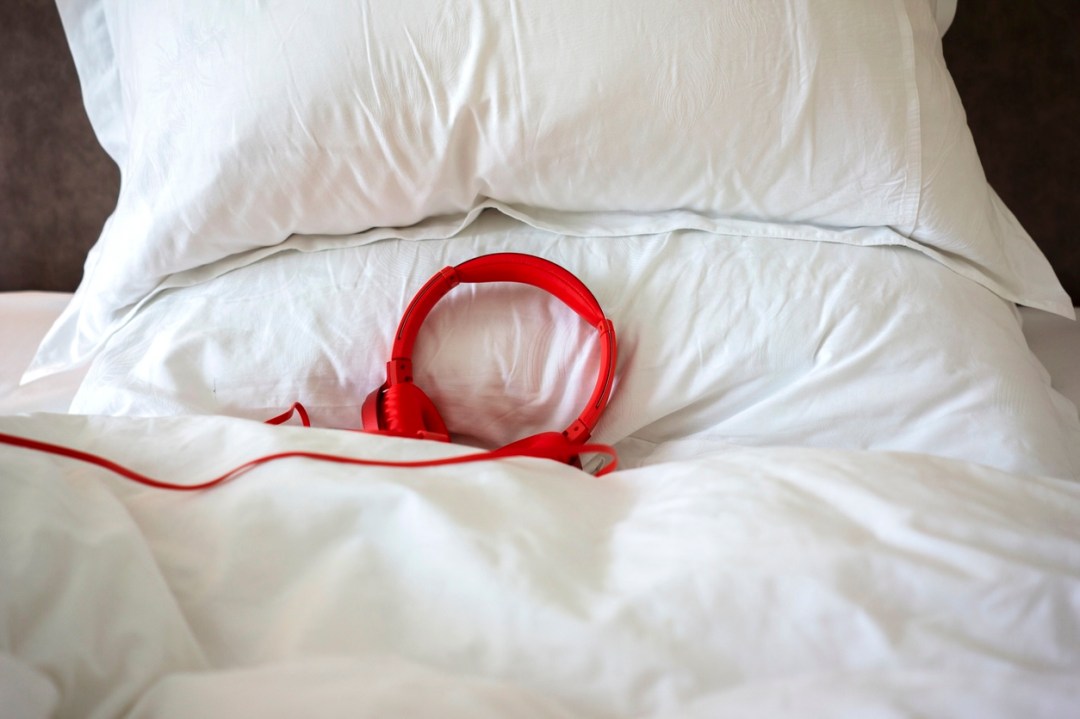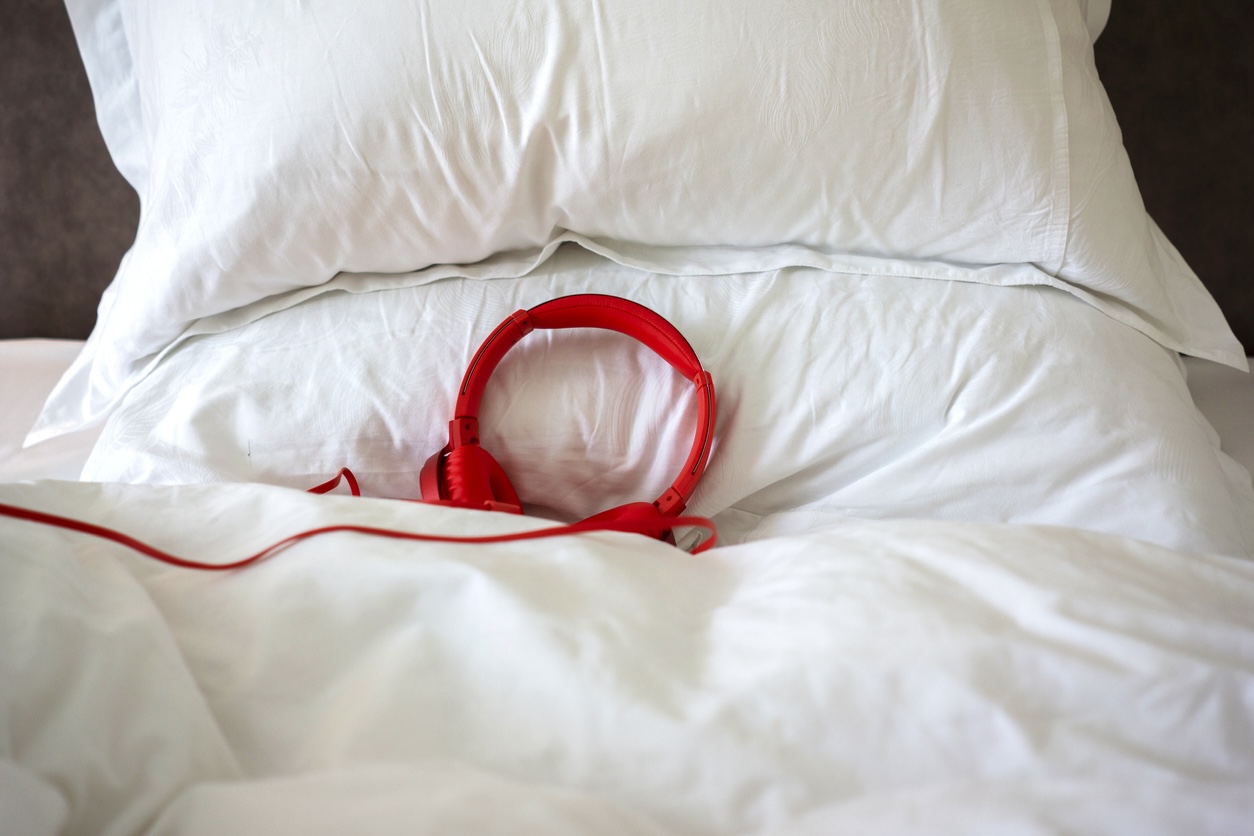I’m sleeping with the actor Richard E. Grant at the minute and can highly recommend the experience. He’s reading Agatha Christie’s The Murder at the Vicarage to me and has the perfect voice for it, faintly lascivious but not disturbingly so. As for the content, it’s just what’s wanted – engaging but not too stimulating. Like so many of us, I’m nodding off to the sound of an audiobook.
Crime novels work well, as long as they are not overly gruesome or suspenseful
I was already enamoured of Richard E. Grant who’d, on other late nights, read me Iris Murdoch’s The Sea, The Sea. The plot unfolds at a gentle pace and nothing unduly dramatic or loud happens – there are no car chases or football chants. Of course, the writing is beautiful and therefore soothing, and you don’t mind hearing the same bits twice. Hearing stuff twice is inevitable as, each night, you rewind, trying to find the point at which you faded out last time.
Half the world seems to be using audiobooks as sleep aids. I’ve noticed that friends visiting at the weekend go to bed with their books on their phones, the timers set. Some even have special headbands so they can listen without disturbing their partners. Friends talk enthusiastically of their night-time listening, as did Spectator writers Toby Young and James Delingpole on their erstwhile London Calling podcast. Both are fans of Bernard Cornwell who, I’m guessing here, is big on military strategy and soldier-talk and relatively low on booming cannons and ear-splitting battle-cries.
It’s all about finding the sweet spot – a book that is appealing enough to be a good companion between the sheets, but not too gripping, disturbing or energising. Solzhenistyn is obviously out, along with Brett Easton Ellis and Cormac McCarthy.
It’s easy to make the mistake of listening to books that look promising but actually keep you awake. I did this with Patricia Highsmith and Ripley (too dark), P.G. Wodehouse (too effervescent), Anna Lembke’s Dopamine Nation (too interesting), Anne Brontë’s The Tenant of Wildfell Hall (religious terrors) and Matthew McConaughey’s Greenlights (he kept shouting the word ‘Greenlights!’). I’m looking forward to Rob Henderson’s new memoir Troubled but fear it’s too thought-provoking for bed.
My friend Jim thinks he’s cracked it by listening to the autobiographies of slightly boring people. He found Claudia Winkleman delightfully ‘one-note’ and the musician Moby devoid of ‘interesting reflection.’ Gabriel Byrne was bliss ‘like having a sensible James Joyce lull you to sleep… I had no idea what was going on.’ But Barbra Streisand’s autobiography was the best: ‘she takes to task every bad reviewer she’s ever had and tells them why they’re wrong,’ for an astronomical 48 hours. That’s a real win – you want a book to last a decent number of nights.
Crime novels work well, as long as they are not overly gruesome or suspenseful; you want the emphasis to be on the journey rather than the outcome. J.K Rowling’s Robert Galbraith books give a good 30 hours of listening each time, have nice pauses in the ‘action’ and are beautifully read by Robert Glenister. Anthony Horowitz’s Hawthorne series is similar, though in danger of being too entertaining. But they come in long, and are read by Rory Kinnear, whose voice is rich and mellow. There are some Ruth Rendells that do the job, and a few of the better P.D James’s. An absolute favourite was Derek Jacobi reading Josephine Tey’s The Daughter of Time.
Of the classics, Trollope is brilliant for falling asleep to. The Way We Live Now is a magnificent 32 hours and is read by Timothy West who also reads The Pallisers series and some of the Barchester books. There are BBC dramatisations of these too, but they’re far too lively for bedtime. I was surprised by Galsworthy and The Forsythe Saga – the plot moved so slowly that I was kept awake by excessive dullness.
Sadly, there are many cases of right book, wrong reader. There’s a great deal of Henry James, Edith Wharton and Elizabeth Jane Howard on Audible that are potentially great night-time books, but are read by Eleanor Bron; a wonderful actress, but for me she reads with too much gusto. The answer, obviously, is to listen to these during the day when doing household chores or running errands.
But there’s something special about the night books. It’s probably the intimacy – the pillow-talk element. And sometimes you find one is absolutely perfect. In my case, that was Dodie Smith’s I Capture the Castle, which I hadn’t read since childhood. It was pure charm and sweetness and the writing so gorgeous it could bear any amount of rewinding. It was read by Jenny Agutter with a sympathetic softness that didn’t stray into sentimentality. Altogether, a lovely way to fall asleep.







Comments